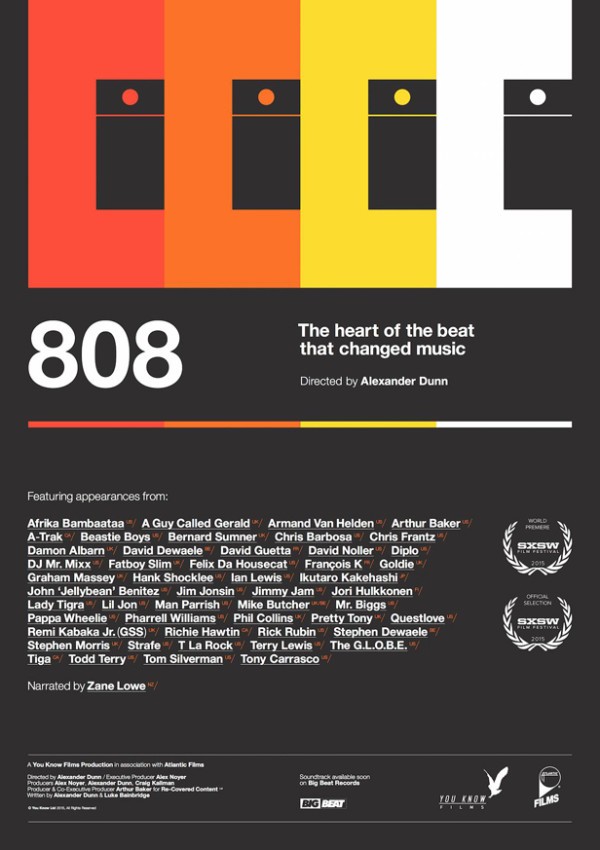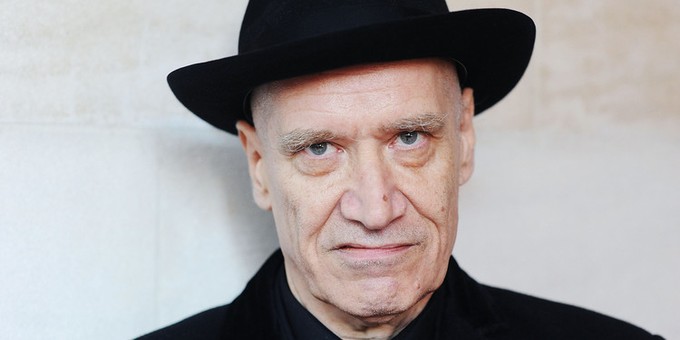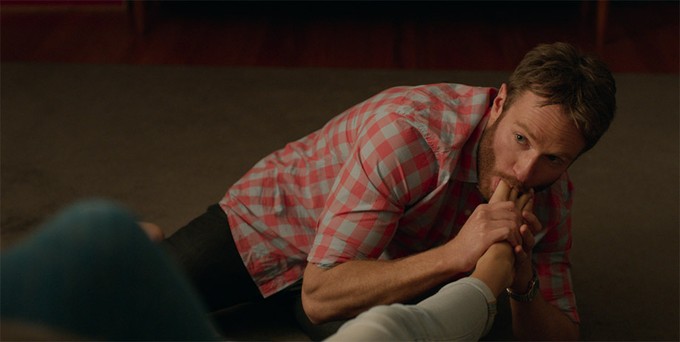
808, dir. Alex Dunn
You ever hear of the Roland TR-808?
The Roland Corporation’s drum machine, one of the first of its kind, was released in 1980 and proceeded to make an unfathomable impact on the music industry. Its level of convenience and portability matched with its unique sound quickly made it a mainstay of many music genres, from R & B to early hip-hop to prog rock all the way to traditional pop music. A number of genres were seemingly born solely out of usage of the 808, including acid house and drum-and-bass. It’s arguably made a bigger impact on the music scene than any other analog tech of the last half-century, yet a very small portion of those who have listened to and enjoyed the machine’s effects have any idea it even exists. You Kanye West fans out there probably remember Yeezy’s homage from a few years back, 808s & Heartbreak, but way more young people out there are aware of Pro Tools and GarageBand than of the legendary 808.
That kind of gets to the point of Alexander Dunn’s documentary: to serve as a history lesson of how the 808 became a staple of popular music, as told by those who used and benefited from the machine. We get interviews with all sorts of legendary icons of the ‘80s and beyond, including pioneers like Afrika Bambaataa, Rick Rubin, and Arthur Baker (who also served as producer), hip-hop legends like The Beastie Boys and Public Enemy producer Hank Shocklee, and contemporary artists like Questlove, Diplo, David Guetta, and Pharrell Williams. They even get Phil Colllins in there to talk about his use of the instrument on tracks like “Abacab” and “I Can’t Dance”. All these guys talk about the songs that made them fall in love with the 808, their own history with it, and the impact that it’s made on popular music on the whole.
Unfortunately, the documentary doesn’t end up having anything particularly profound to say on the subject. There is some talk, particularly at the end, over the specific sonic reasons that the 808 proved to be so infectious, and even less talk about the actual history of the machine, but most of the film is a catalogue of the most iconic tracks that prominently utilized its recognizable sounds. As a fan of early hip-hop, and of ‘80s pop music in general, I had a great time running through the songs that lined the path for the meteoric rise of the 808, and I learned about certain tracks and artists I probably never would have had exposure to otherwise (seriously, a soundtrack album to this film would be a phenomenal mix of hip-hop, dance, and pop that would blow your ass away). If this were a VH1 documentary or something, I would be singing its praises from the rafters, particularly considering how little attention the vast majority of lesser known 80s music often receives.
But as a self-contained documentary, I find it hard to recommend to those who aren’t a fan of this type of music. There is very little depth in the analysis of why the 808 was such an addictive sound for both producers and audiences; when L’il Jon gets as into what he thinks the appeal of the instrument is as anyone else, it indicates that no one really had anything that mindblowing to relay on the subject. Everyone says they like the 808 (some even say why), and that it appeared in a huge array of music both in the U.S. and worldwide, but no one scrapes the surface of how this individual piece of tech found its way into, as two interviewees claim, over 20 million records and 90% of what’s on the radio.
As a commercial for the now-defunct product (it was discontinued in 1983), it is fairly powerful. Despite its ubiquity in the music scene, many of its signature sounds are unique to the 808, and were never able to be replicated in later, more advanced drum machines (a huge reason why the original 35-year-old instrument remains in-use to this day). The amount of talent on display, and the songs trotted out as showcases for the 808, is daunting, and at times truly engaging. There are funny, extended moments with Mike D and King Ad Rock of The Beastie Boys, made bittersweet and more than a little tragic without the presence of fallen Beastie Adam Yauch a.k.a. MCA (and gets even worse when they admit that he was the only one who really knew how to use the 808). The idea that stuff like L’Trimm’s “Cars With The Boom” an T La Rock’s “It’s Yours” get discussed alongside “Sexual Healing” and “Trans-Europe Express” is singlehandedly badass and novel enough to intrigue music fans. The various animations fly fast and furiously, and the film only outstays its welcome with a climactic interview with one of 808’s creators (after an hour-half of dope tunes and musical icons, an engineer discussing tech through a nose ventilator seems arbitrary and besides the point). But I wish it worked better as emotional experience, or as a way to teach young people why a machine possibly as old as some of their parents has stayed relevant over the course of three-plus decades.
Still, if the title/subject matter alone was enough to get you interested in this doc, you probably won’t be disappointed. I wasn’t.

THE ECSTASY OF WILKO JOHNSON, dir. Julien Temple
I’d never heard of Wilko Johnson before seeing this film, but I’m sure many of you are aware of who he is and his unique sensibilities. If not, here’s as quick of a recap of his legend as this film gives you: Mr. Johnson was the lead guitarist for a band called Dr. Feelgood, and was famous for his onstage behavior and his melodically percussive playing style. When he was 65, he was diagnosed with pancreatic cancer, and was given 10 months to live, 12 with chemotherapy. He did not experience the Kubler-Ross’s five stages of grief, far from it: Mr. Johnson experienced a degree of euphoria and enlightenment that changed his life, and accepted his impending death. Far from feeling enclosed by the finality of his situation, he felt liberated by the knowledge that his destiny was complete, providing him with nothing but joy and the pure and utter ecstasy of the title.
Legendary documentarian and music video director Julien Temple has created a film that attempts to communicate that ecstasy to its viewers, while also honoring and examining a very intelligent and unique individual. Johnson is a magnificent subject, and it’s unsurprising Temple was able to compile a movie’s worth of riveting footage of the guy; he is extremely well-learned and well-read, and is somehow able to verbalize and clearly convey very complicated philosophical notions using both facts and literary quotations, mostly from Shakespeare.
It should be said that this is no staid talking-heads doc featuring Johnson sitting in a chair pontificating his existence. Temple’s film is fantastically visual, constantly intercutting between excellent nature footage, abstract imagery, old film clips (STAIRWAY TO HEAVEN and Christopher Plummer’s HAMLET are prominently featured), and Johnson himself, both on stage and off. This aesthetic is linked to Wilko’s own post-diagnosis thoughts, where he found himself fascinated and absorbed by not only magnificent things like landscapes and mountains, but also by “the dustbin on the corner” and other elements of our day-to-day lives we typically take for granted. He emphasizes how “alive” everything suddenly seemed, and Temple’s style aggressively attempts to transmit that to the viewer through a very precise sensory display. The success of the attempt, as in any artistic endeavor of this level of ambition, is probably subjective to the viewer, but I found myself deeply affected by Johnson’s thoughts complemented by Temple’s complex visual tapestry.
There’s even a level of surrealism to the thing, which you don’t typically find in documentaries for obvious reasons. We see Johnson playing chess with Death on the seashore like Antonius Block in THE SEVENTH SEAL, but when we eventually cut to Death’s face, it is Johnson himself, in a hood. We see images of death prancing around the countryside, walking elegantly and swiftly, without malice. There are sets, like Johnson’s rooftop telescope and an old, empty drive-in (with old flips of Johnson playing, no less) that, if they aren’t fake, certainly come across as such. Johnson has a particular look, and Temple sometimes lights him frantically and shoots him up close so he seems like a Malcolm McDowell character barking in your face, even though what he’s saying is quite thoughtful and never malicious.
It is always very tricky to make a film about death, or even serious disease, without alienating your audience or lingering on tired old points. It’s no coincidence that Johnson keeps quoting Shakespeare and Milton, because though everyone witnesses and experiences death at some point, few others have ever come up with anything relevant or profound to say on the subject (I always like to cite Stephen Frears THE HIT as a brilliant contemporary examination of mortality, but that’s for another day). But Johnson is not, as Jemini said, “your average mediocre local vocalist.” Even disregarding his musical career and worldwide fame, he’s as fascinating a subject as they come, sharing an outlook and a lifetime of interests that make it wonderfully rewarding to spend time examining his mind. The story must inevitably deal with the elephant in the room, the fact that as time goes by Johnson is getting closer and closer to his fate, and the way that develops is the final step in making this film powerful on an emotional level, as well as a psychological and philosophical one. I thought I had this one pegged in the first five or so minutes; I’m rarely as glad to be caught being a pompous, assumptive critic.

THE LITTLE DEATH, dir. Josh Lawson
“The Little Death” is a metaphor for an orgasm, more than likely sourced from Puritan-era Europe as a means to separate sexual desire from the act of procreation (remember, the female orgasm was, and still is, a mark of impurity in many cultures). Writer/director/star Josh Lawson’s dark comedy is a humorous look at the various things that get our motors running, via a handful of couples living in and around Sydney, Australia. Lawson intercuts between the various couples’ stories, centered around particular fetishes, which are mentioned at the intros of their respective stories. SEXUAL MASOCHISM- a woman admits to her 6-year boyfriend she is turned on by the idea of getting raped, and the poor guy bends over backwards to try and fulfill her fantasy. ROLEPLAY FETISHISM- a man and his wife have their sex lives kickstarted by acting out roles in the bedroom, but the husband starts showing more concern over his acting than towards the actual lovemaking. DACRYPHILIA-: deriving sexual pleasure from watching someone cry- a wife prods her husband about his recently departed father to get stimulated by his tears, and when that stops working, begins to conjure up new ways to depress him into squirting a few. SOMNOPHILIA: a desire to sleep with an unconscious partner: a beleaguered husband starts feeding his wife illicit sleeping pills every night to spend quality time with her without having to deal with an earful of bitching. And finally TELEPHONE SCATALOGIA: being aroused by obscene phone calls- a deaf man utilizes a video telephone relay service to put a call into a phone sex line, forcing the translator to both describe what the man wants to the sex operator and to enact her response with sign language.
Lawson has been acting in American fare like THE CAMPAIGN, ANCHORMAN 2 (as the Rupert Murdoch-y TV exec), and TV’s HOUSE OF LIES (where he’s consistently hilarious as the Harvard-educated Doug) for a few years now, but he went back to Australia for his first venture behind the camera. He shows a great ear for human comedy, which isn’t that dissimilar from his mannered work on HOUSE OF LIES. The introductions for each of the stories are presented in a deadpan, slightly off-kilter tone that immediately sucks you in with the promise of grotesque sexual misadventures and larger-than-life marital misunderstandings. The section he stars in, SEXUAL MASOCHISM, is among the funniest, as his character earnestly and desperately tries to create a believable rape scenario to get his wife off (when she tells him she recognizes him by scent, he douses himself with deodorant right before the act to help sell the idea that it’s a random assault). The roleplaying plotline goes a little over the top, as the actor-wannabe husband gets so enamored with being a thespian that he isn’t even aware of his wife’s pregnancy, but his ambition is so outlandish and goofy it manages to work anyway. One pitch-perfect running joke involves a convicted sex offender who’s just moved into the neighborhood introducing himself to the characters in the film; constantly expecting a very particular response from his neighbors, he keeps getting surprised and befuddled at the weird sights he witnesses at each of their doorsteps.
However, when the stories start to lean towards the dramatic in the second half of the film, it started to lose me. Lawson is shooting for a particular blend of comedy and drama, with the extremism of the laughs setting up smaller, human moments, but they don’t always pop off, and the stories that end in black comedy make a bigger impression than the ones that end in pathos. He mostly intercuts between the different couples, but saves the entire last story for the final reels, and it strikes the best balance between the crude sex humor and the touching human interaction of all the plotlines. It also has the best ending of the five segments. Unfortunately, Lawson feels like he needs to to drive home the fact that relationship problems stemming from sex are, in fact, deeper problems in the relationship, and I don’t think we, as an audience, need to be told that. The actors are talented and immersed enough that we are aware of their tension and angst through body language and facial expressions, and souring the stories up at the tail end isn’t always as effective as maintaining the comic tone.
Still, I was laughing my ass off for a great deal of this film, and the final story hits the perfect mix of dark comedy and romance to send you off with a smile. Lawson is just as funny of a writer as he is a performer, and I am eagerly awaiting his next turn in the director’s chair, or at least behind the typewriter. There are a million and a half American sex comedies (usually inappropriately referred to as “late night comedies”), but probably 99% of them belong in the bargain (or the trash) bin. This one aims a little higher, and tries to cut a little deeper, and even if it isn’t perfect, it manages to tackle its complicated subject matter with bravery and an absolutely killer, almost sinister sense of humor.
